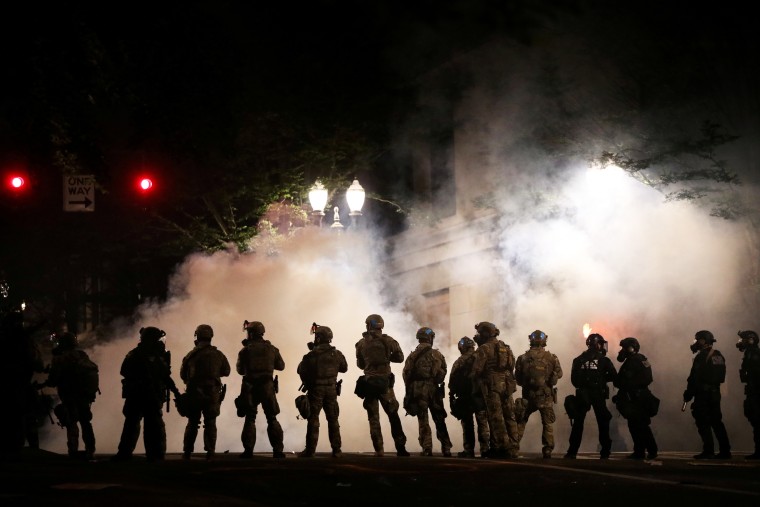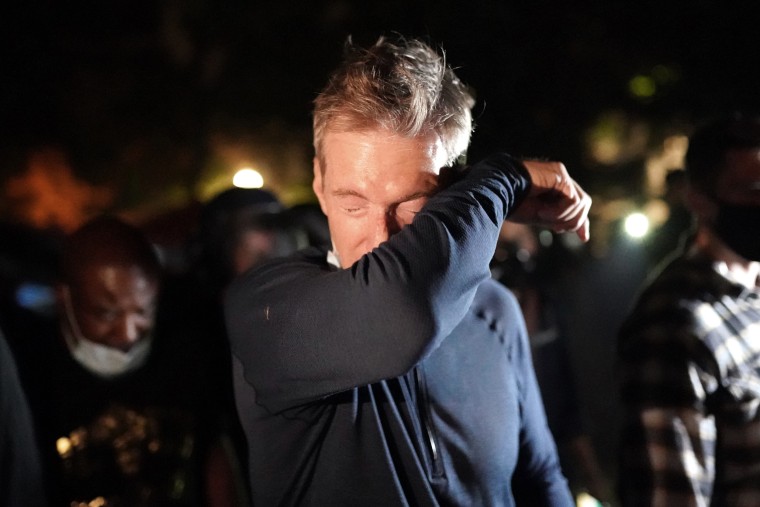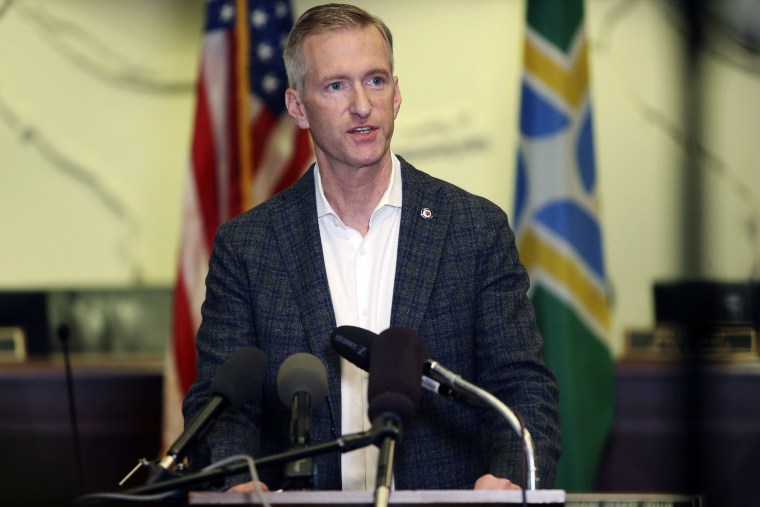Summer has not been kind to Portland Mayor Ted Wheeler.
The city, better known for its lush green spaces and “Keep Portland Weird” signs, became the center of fierce protests over police brutality after George Floyd’s death in Minneapolis. For more than 100 days, progressive and conservative demonstrators have descended on downtown Portland, some calling for the abolition of the police department and others showing support for law enforcement.
At the center of the ongoing unrest is Wheeler, a Democrat running for re-election in November despite continued calls for his resignation by people on both sides of the political spectrum.
Conservatives claim he has not done enough to protect the city from protesters who have gathered every night for more than three months, sometimes lighting fires and antagonizing police. Progressives say he hasn’t done enough to protect residents from police officers who lob tear gas and other projectiles into crowds.
President Donald Trump called Wheeler a “fool” for not reining in protesters, while Black Lives Matter advocates said Wheeler mishandled the unrest, which shows no signs of slowing down.
“I am embarrassed for him,” protester Alacia Lauer said during a July demonstration. “It’s about time that Ted Wheeler realizes that people are demanding real change in the system. Zero [change] is causing nightly violence.”

Although Wheeler denounced the presence of federal officers in Portland, he allowed local police to use tear gas against demonstrators from May until just this week. He has expressed support for protesters demanding racial equality but cautions against using violence during marches.
“The middle ground is very elusive right now,” Wheeler said. “When it comes to solutions, compromise is seen as a dirty word.”
Demonstrators went to Wheeler’s own doorstep last month when they staged a sit-in in the lobby of his condominium building. Then, on his 58th birthday, protesters returned to the building, calling for his resignation and demanding that he slash the police budget in half.
Those protests quickly turned ugly as crowds lit a fire in the street, shattered windows and broke into a ground-level dental office, the Oregonian reported.
A few days later, Wheeler sent an email to his neighbors offering his “sincere apologies for the damage to our home and the fear that you are experiencing due to my position,” the newspaper reported. The mayor said he would find a new home as a result of the protests.
Wheeler, the scion of a wealthy Oregon timber family and state treasurer from 2010 to 2017, continues to face pressure on multiple fronts: the coronavirus pandemic, ongoing protests over racial disparities, an upcoming re-election in November and now plumes of heavy smoke billowing into the city from a nearby wildfire.
“He’s just one man,” said the Rev. E.D. Mondainé, president of the Portland NAACP. “I think it’s important that we have a two-term mayor and that we don’t lose sight that he has been courageous in leading us.”

Wheeler's three predecessors were all one-term mayors, and the city’s unique power structure, sometimes called a “weak mayor” system, makes governing difficult, he acknowledged.
Portland is the only major U.S. city to retain a commission in which all five members of the city council, including the mayor, share legislative, administrative and quasi-judicial duties. The commissioners administer and oversee individual city bureaus, and ordinances are passed with a simple majority.
The mayor is empowered to assign commissioners to city bureaus and create Portland’s budget, but otherwise power is shared among the commissioners.
If re-elected, Wheeler hopes to change that structure, he said.
“You have five different mayors overseeing different city services, so it creates a tremendous amount of confusion about who's in charge of what issues,” he said. “It’s a fundamentally inefficient form of government.”
One of the bureaus that falls under Wheeler’s jurisdiction is the police department. In Portland, mayors double as police commissioners unless they assign the bureau to another commissioner. The arrangement became a flashpoint this summer after local law enforcement used tear gas and other munitions against protesters.
Portland Commissioner Jo Ann Hardesty, a Black woman who once served in the U.S. Navy and the Oregon state legislature, criticized the tactic and repeatedly asked Wheeler to allow her to take command of the police department. Wheeler rejected the request in July, but has since said he is open to revisiting the issue if reelected.
“I told Commissioner Hardesty that come January, all of the bureaus are up for discussion,” he said.
On Thursday, Wheeler announced he is banning Portland police from using CS gas, a powder that when mixed with solvent becomes an aerosol in tear gas, for crowd control.
Oregon law enforcement agencies called the move “reckless and short-sighted.” Daryl Turner, president of the union representing Portland police, said the ban will “blow up in the mayor’s face.”
“What he does not seem to understand is that the CS ban will force officers to use more impact munitions and use more physical force to disperse crowds,” Turner said in an emailed statement. “His decision hurts community safety and impacts officer safety.”
Wheeler’s challenger, progressive candidate Sarah Iannarone, said the ban should have come much sooner.
“It’s too little too late,” she said. “My neighbors have been gassed in their home, moms have been gassed in the street. In my opinion, that’s what Portlanders will remember come November.”
Mondainé says both the mayor and the police department appear “desperate” to quash the violence that inevitably follows the nightly protests.
“What I hear is frustration,” Mondainé said. “[Wheeler] has done everything in his power to find out how others would handle this issue. I believe he is sincere in his efforts.”
In a phone interview Friday, Wheeler defended the ban and its timing. He said it was a “show of good faith” for residents who want to see tangible police reform and a way to calm some of the chaos overtaking parts of the city.
“I am doing what needs to be done under difficult circumstances,” he said. “Portlanders are sick and tired of the nightly violence. They want to get back to being Portland again.”
In a poll released this week by the Oregonian, nearly 2 out of 3 Portlanders said they view the mayor negatively just two months before the election. But even some of his most vocal critics, including Hardesty, said Portland does not need another one-term mayor.
“It’s hard in one term to get your colleagues and your community moving in the same direction,” she said. “This year we’ve had four major crises that would try any mayor and any elected leader.”
Both supporters and detractors have praised how Wheeler has handled the coronavirus pandemic. Portland was one of the first cities to issue stay-at-home orders, and Wheeler was among dozens of Oregon mayors to pressure Gov. Kate Brown to take those orders statewide.
In late March, the Portland City Council approved $3 million in emergency funding for its COVID-19 response. The money was used for small business and housing relief. Some of the earliest funds went to Asian-owned businesses that had been discriminated against because of the coronavirus.
“That was leadership,” Hardesty said. “That was understanding that if we don't get a handle on COVID-19, our community was going to have severe consequences.”
Iannarone also praised Wheeler’s pandemic response, saying he would probably be a “shoo-in” for re-election if Portland’s woes had stopped with the coronavirus. But Wheeler faltered with the police department and, more significantly, with people calling for police reform, she said.
“He is entitled and detached from the everyday lives of Portlanders,” Iannarone said. “This is a place where community rules. Everything is about community, and he is not listening to the community.”
Because of Wheeler's missteps, he is now finding it difficult to connect with the community. In July, as protests entered their 60th day, Wheeler attempted to address demonstrators outside the federal building. His “listening” session, billed as an opportunity for him to meet with protesters and hear their concerns, dissolved into chaos. He was drowned out by taunts and jeers as people screamed over him and asked him to leave or resign.
A few hours later, Wheeler was standing outside the federal building when Department of Homeland Security officers deployed tear gas to push protesters away from the perimeter. Wheeler, one of dozens of people standing in the front row, was enveloped in the noxious irritant.
Later, when he attempted to retreat to his offices, a crowd followed him, throwing water and paint as he rushed inside.
“He excelled in responding to COVID-19, he excelled in responding to the economic devastation that followed, he did OK when Trump sent his forces in, but he failed in holding police accountable,” Hardesty said.
Wheeler said he remains undaunted by the challenges facing Portland. Rather than “capitulating,” he is “energized.”
“It’s a time for strong leadership,” he said. “It’s a time to bring our communities together and face everything head-on.”

